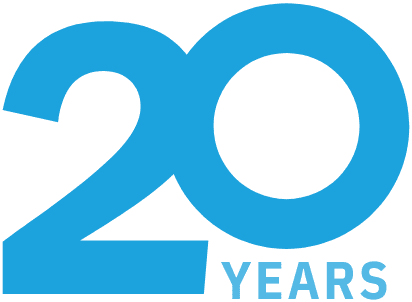Managing medical office records can be challenging, particularly in negotiating resource allocation and space issues. A records management guide for medical offices walks you through the ins and outs of managing patient data legally and safely. Protect your medical practice today by getting the best records management guide. If you’re ready to enact cost-effective measures for your medical office, get a quote for secure records management today.
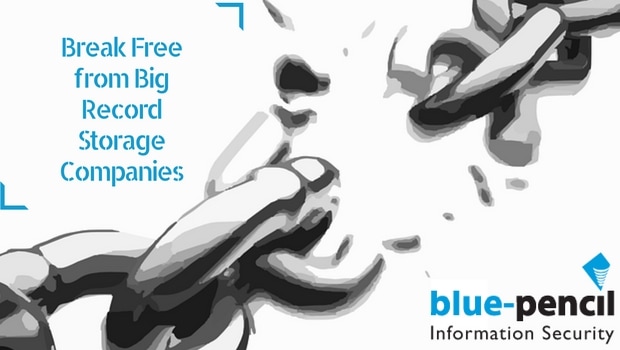
“… we were pleased to have Blue Pencil take on our storage needs after many years of using their shredding business. Since moving our documents from a large international storage company we felt we regained control of our documents with live and responsive service people. Whether it be a rush or a regular request we have never had an issue with the open communications that Blue pencil delivers. We would not hesitate to recommend Blue Pencil for your storage or shredding needs”
– Andrew
Click here for more customer reviews
Medical Office Records Management Guides Ratings
Here we review and rate some of the available medical records management guides. We rated 10 of the top records management guides for theory, hands-on application, and Ontario relevancy to help medical office practitioners quickly get the information they need. The College of Physicians and Surgeons of Ontario took the top spot, see below for the pros and cons overview for each guide.
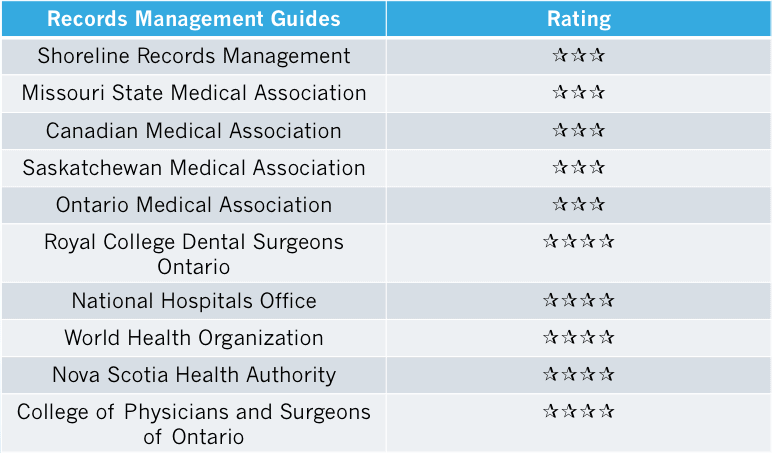
#10 Medical Record Reference Guide – Shoreline Records Management

Rating: ![]()
![]()
![]()
Pros: A straightforward primer to what a medical record is and its history.
Cons: Limited in depth, more suited as a starter reference than for providing tactical recommendations.
#9 Guide to Medical Records and Missouri Law – Missouri State Medical Association

Rating: ![]()
![]()
![]()
Pros: A great essentials guide to managing patient data in the medical office. This resource answers questions such as how long should information be retained as well as which parts of a medical record can be released.
Cons: This guide is great for general learning but for practitioners in other locales like Canada, a more definitive resource may be required.
Source: Missouri State Medical Association Medical Records Guide
#8 Medical Records Management – Canadian Medical Association

Rating: ![]()
![]()
![]()
Pros: A solid resource that balances rationale, strategies, and practical tips. It also provides a solid background on the legislation mandating practices like information retention and privacy concerns.
Cons: The challenge that is alluded to is managing an extensive amount of paper information without providing a cost effective solution like records management services.
#7 Privacy FAQ – Saskatchewan Medical Association

Rating: ![]()
![]()
![]()
Pros: A quick FAQ privacy guide to managing both electronic and paper medical records. This resource cuts to the chase, answering the top questions practitioners may have.
Cons: Content is aligned with the province of Saskatchewan and may not be as applicable to other jurisdictions. Further, the content provides little operational guidance for use in the medical office.
Source: Privacy FAQ
#6 Privacy and Security Guide and Workbook – Ontario Medical Association

Rating: ![]()
![]()
![]()
Pros: Did you know the first thing to get started is to assign a privacy contact in your office? The OMA’s Privacy and Security guide helps you understand the best practices in managing client information.
Cons: The best way to use this guide is pair it with the more high-level records management life cycle guides. This resource is intended to help your medical office’s records management program to excel in privacy and security.
Attachments:
Privacy & Security Guide and Workbook (PDF version)
#5 Electronic Records Management by Royal College of Dental Surgeons of Ontario
Rating: ![]()
![]()
![]()
![]()
Pros: A stellar technical playbook for how to manage medical records in their electronic format with an eye to security and privacy considerations. Practitioners will discover a great balance for managing the availability of information along with privacy needs.
Cons: Since this content is provided by the Royal College it is more focused on serving Dental Office practitioners.
Attachment
Electronic Records Management (PDF)
#4 National Hospitals Office Code of Practice for Healthcare Records Management by National Hospitals Office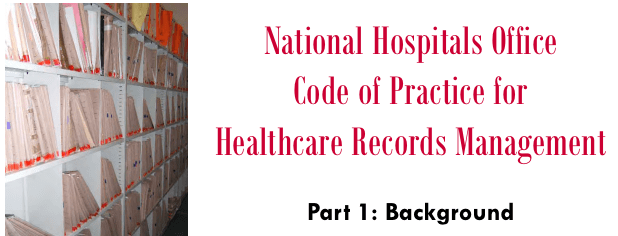
Rating: ![]()
![]()
![]()
![]()
Pros: A comprehensive guide spanning over 300 pages on how to run a hospital office. From clinical staff to records management responsibilities this is a guide for those who are looking to dive into the deep end.
Cons: The guide is extensive and may be overwhelming for medical offices that are looking for a less detailed framework or paradigm.
Attachment
National Hospitals Office Code of Practice for Healthcare Records Management (PDF)
#3 Medical Records Manual by World Health Organization
Rating: ![]()
![]()
![]()
![]()
Pros: A tailored guide for medical office practitioners to start and operate a medical records department. This is one of the most hands-on guides and is tailored for less developed countries along with end-to-end prescription on even how to hire the right medical records professional.
Cons: This guide is more practical but also suffers from being a resource that may be more applicable to a full-scale hospital records department than a medical office.
Attachment
Medical Records Manual (PDF)
#2 Records Management Guide for Research Records by Nova Scotia Health Authority

Rating: ![]()
![]()
![]()
![]()
Pros: A detailed and strategic guide offering a big picture view on the main categories of medical records. This guide also offers helpful visuals in understanding the overall records lifecycle. What impresses us most is the detail provided.
Cons: This guide is more geared towards medical research offices so there is content that may not be as relevant to other medical offices.
#1 Medical Records – College of Physicians and Surgeons of Ontario
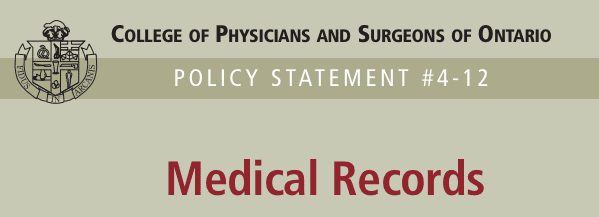
Rating: ![]()
![]()
![]()
![]()
![]()
Pros: Extensive depth and breadth of content offering insights into what a medical record is and how to manage it effectively. This guide also offers great tips on managing your information from creation to disposal along with tips to transitioning from paper to electronic records.
Cons: This guide is lighter visually but the content stands on its own.
Attachment:
College of Physician and Surgeons of Ontario (PDF version)
Medical Office Partner in Managing Client File Headaches and Legal Liabilities
Blue-Pencil is the professional records management service that continues to improve in order to get the best value for clients. Blue-Pencil offers medical practitioners and office staff the ability to train and hone their information management skills. We provide a service while empowering you to better manage your ever increasing information footprint while reducing legal liability in patient health information management. 
![]() Medical industry’s trusted and high-value service provider
Medical industry’s trusted and high-value service provider
![]() Training, resources, and support for your staff to become adept at information management.
Training, resources, and support for your staff to become adept at information management.
![]() High standards in information destruction services with NAID AAA and Privacy+ certification
High standards in information destruction services with NAID AAA and Privacy+ certification
![]() Ability to invest in client document relocation from incumbents to ensure best value and records management program effectiveness.
Ability to invest in client document relocation from incumbents to ensure best value and records management program effectiveness.
Blue-Pencil is an information management company that has been serving the needs of clients in Canada since 2004. We have grown our document security business over the past 10 years, serving more than 6,000 organizations including small and medium-sized companies as well as Fortune 500 businesses. We have recently launched two new divisions: Documents Storage and Records Management division and Document Imaging and Scanning Solutions division. This allows us to offer full spectrum, comprehensive solutions for information security management. We service the GTA and surrounding cities – click here for a full list of our service areas. If you’d like to learn more about us and what we can do for you, contact us today!
